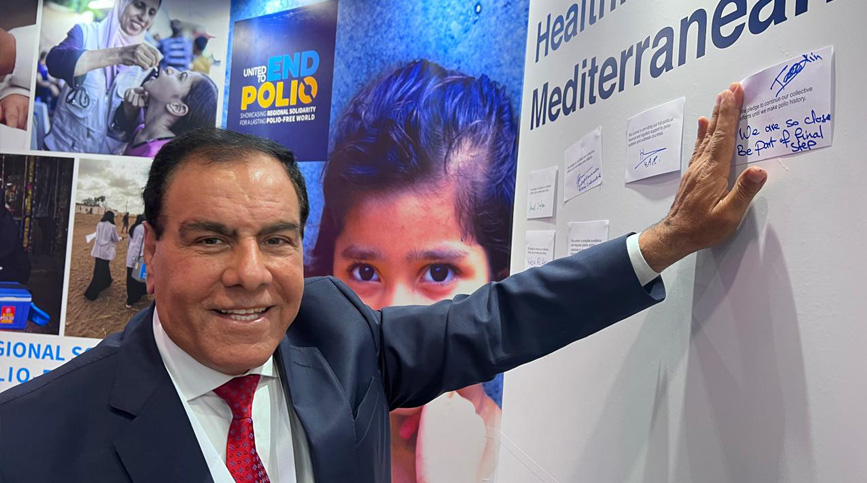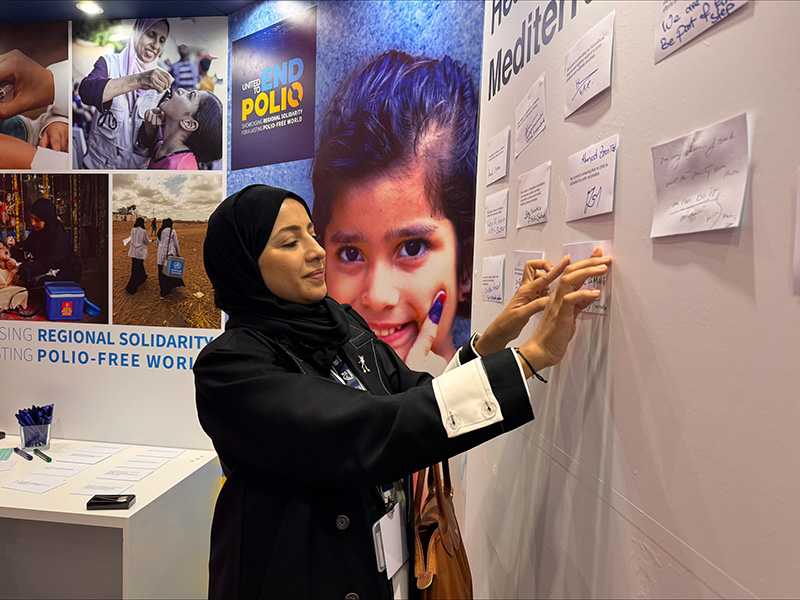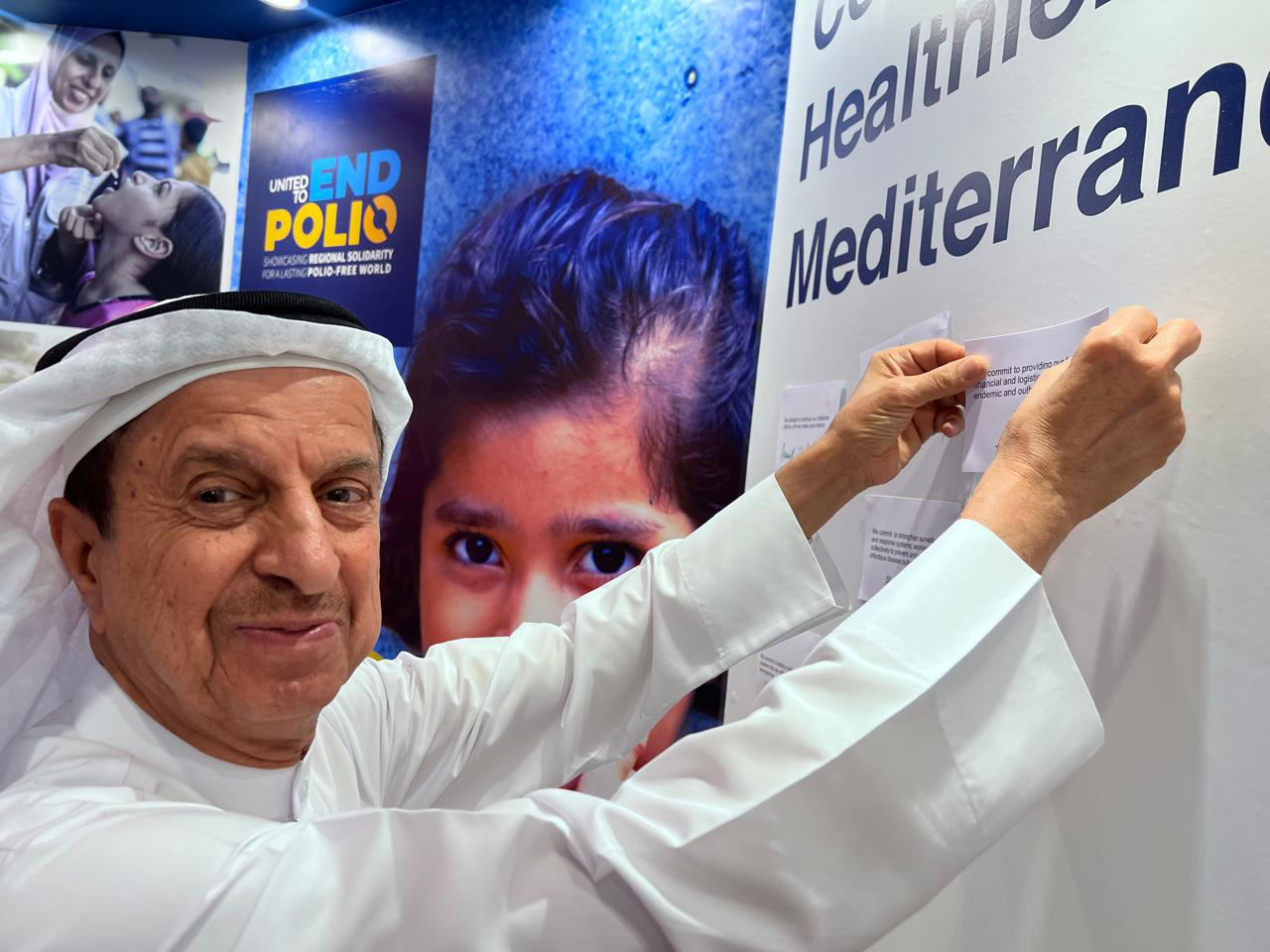
15 October 2024 –The 12th meeting of the Regional Subcommittee for Polio Eradication and Outbreaks was held during the 71st session of the WHO Eastern Mediterranean Region’s Regional Committee, marking another crucial step in the region’s pursuit of a polio-free future. The session witnessed robust participation, with a high number of interventions from Member States and members of the Regional Subcommittee, each highlighting their individual and collective efforts to eradicate polio and ensure its lasting elimination.
 During the session, participants acknowledged that while significant progress has been made in the fight against polio, several persistent challenges continue to impede the goal of eradication. Inaccessibility, extensive population movements, suboptimal campaign quality in certain areas, community fatigue, and the ever-present threat of insecurity and conflict remain major obstacles. These issues have prevented health workers from reaching every child with life-saving vaccines, particularly in conflict-affected and hard-to-reach areas across the Region.
During the session, participants acknowledged that while significant progress has been made in the fight against polio, several persistent challenges continue to impede the goal of eradication. Inaccessibility, extensive population movements, suboptimal campaign quality in certain areas, community fatigue, and the ever-present threat of insecurity and conflict remain major obstacles. These issues have prevented health workers from reaching every child with life-saving vaccines, particularly in conflict-affected and hard-to-reach areas across the Region.
In a statement delivered on behalf of the co-chair of the Regional Subcommittee on Polio Eradication and Outbreaks and Chair of the polio session Dr Hanan Al-Kuwari, a delegate from Qatar noted that despite the setbacks, the programmes in Afghanistan and Pakistan have shown resilience, continuously adapting and responding to the highly complex contexts they operate within.
“These epidemiological trends remind us that the journey towards polio eradication is not a straight path. Gaps in surveillance, immunization coverage, and campaign modality and quality must be addressed swiftly and collectively,” Dr Salih Al Marri said.
 During the session there was a clear, unwavering commitment from the Member States and the Global Polio Eradication Initiative (GPEI) to push forward. Dr. Chris Elias, Chair of the Polio Oversight Board, delivered a statement on behalf of the GPEI partners, recognizing both the achievements and ongoing struggles within the Region. He praised the Region’s tireless efforts to contain outbreaks, but emphasized that much work remains, particularly in the face of new polio cases and the obstacles presented by conflict and instability.
During the session there was a clear, unwavering commitment from the Member States and the Global Polio Eradication Initiative (GPEI) to push forward. Dr. Chris Elias, Chair of the Polio Oversight Board, delivered a statement on behalf of the GPEI partners, recognizing both the achievements and ongoing struggles within the Region. He praised the Region’s tireless efforts to contain outbreaks, but emphasized that much work remains, particularly in the face of new polio cases and the obstacles presented by conflict and instability.
“Despite the challenging trends in polio’s epidemiology, I remain hopeful. Now it is essential that all Member States come together to renew their commitments and discuss tactics to end polio, so that no child has to suffer the devastating consequences of this disease. I am confident that together, we can end polio once and for all.”
The discussions highlighted the importance of continued focus on polio eradication, even as the Region grapples with other pressing health challenges. Member States reaffirmed their commitment to the vision of a polio-free world, recognizing that it sustained political focus, investment, and collaboration on all fronts.
Dr Hanan Balkhy, Regional Director for WHO’s Eastern Mediterranean, concluded the session by calling on Member States to reflect on what they can do to move the needle on polio eradication and redouble their efforts and commitments.
“We must continue to act with urgency and ensure this urgency and commitment reaches frontline workers who represent our work, and communities who look to us for better health and fuller, more productive lives,” Dr Balkhy said.
The collective message was clear: polio can, and must, be eradicated in the Eastern Mediterranean, and the essential functions that support this goal must be maintained to ensure the lasting success of this historic global public health mission.
At RC71, the polio eradication programme launched a regional advocacy campaign to highlight the actions Member States are taking to accelerate progress towards polio eradication. The campaign titled “United to End Polio: Showcasing Regional Solidarity for a Lasting Polio-Free World” features success stories from across the Region. Success stories will be promoted during the Regional Committee at the polio exhibit and in the programme’s World Polio Day commemorations, with plans to work with Member States for the coming year to highlight the bold strides they are taking to make polio history.


